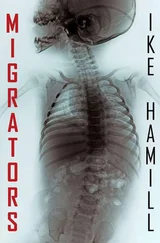“Clumsiness?” asked Dr. Stuart.
“Yeah,” she sighed. “They call it ‘situational clumsiness,’ and they ruled out that developmental thing.”
“Dyspraxia?” Dr. Stuart offered.
“Yes, that’s it,” she continued. “The thing is, it only seems to happen sometimes. He’s great at sports and things, but sometimes you wonder how he makes it across the room. His body is always covered in bruises, as you can see. And today—this is the first time he’s ever been in the hospital because of it.”
“Well,” said Dr. Stuart, “I’m not entirely sure that his pneumothorax, the lung problem he’s having, was entirely caused by the fall he described.”
“Oh no,” Melanie’s shoulders slumped. “What is it?”
“I can’t be sure yet,” said the doctor, holding up the palm of his hand, “but there is a congenital disorder we need to rule out. It’s called Marfan syndrome, and it can sometimes cause pneumothorax.”
Melanie bent her head and cradled her forehead in her hand.
“But this brings me back to his history. Tell me about the tests Chisholm ran.”
Melanie looked up at Dr. Stuart and blinked tears back from the corners of her eyes. She shook her head and sighed. “He was very odd about it all. I don’t know what he was trying to prove or figure out. Poor Davey couldn’t take all those examinations.”
“We need to do everything we can to diagnose him, Ms. Hunter. The sooner we find problems, the easier they are to deal with,” prompted Dr. Stuart.
“I know, I know,” said Melanie. A tear leaked from her eye and she wiped it away as she tilted her head to the side. “It’s just that he was so creepy,” she said.
“Who’s that?”
“Dr. Chisholm,” she admitted. “He seemed so interested in Davey’s early puberty. It was so uncomfortable—I was so uncomfortable and Davey was too, I could see it in his eyes when Dr. Chisholm was examining him.” She used her fingers to make air quotes while she said “examining.”
Dr. Stuart pinched his mouth into a thin horizontal line and looked down at the chart.
“I should tell you,” said Dr. Stuart, “that I consider Dr. Chisholm to be a brilliant doctor, and an unparalleled diagnostician.”
“Yeah,” Melanie said as she squeezed her eyes shut. “That’s what everyone says." She shook her head with resignation.
“Hold on,” Dr. Stuart jumped in, “I should also tell you—he was my doctor when I was a kid, and if I had a son, I would never take him to Dr. Chisholm.”
Melanie looked up and studied the doctor’s moist eyes.
Dr. Stuart looked away first and took his gaze out the window. “Actually,” he said, “I shouldn’t have told you that at all.” He smiled. “I mean, I have no evidence, and he never really did anything out of the ordinary. Nothing that any doctor wouldn’t do when examining a child. It’s just that he somehow made the whole thing seem wrong.”
They sat in silence for a moment.
“How about we not talk about unsupportable allegations that will get me fired and ruin my not-so-young and mostly promising career?”
Melanie chuckled at first and then broke into a sincere laugh in spite of the reason for their conversation. Dr. Stuart smiled while she laughed. By the time her laughter had died away, her eyes resumed leaking. She dabbed at them with a tissue, pulled from her pocket.
“Okay,” she said. “So what is it?”
“Short answer: don’t know,” he admitted. “But we’ve fixed the pneumothorax. He had air outside of his lung, and that was causing his trouble breathing. The blood was from the pressure in his chest cavity; it forced some blood through the vessels in his right lung. I’d like to see him stay overnight for observation, and then a week at home to minimize his activity.”
“Okay,” Melanie sighed.
“And I really want to get these follow-up tests done,” he tapped the clipboard. “I’m not big on poaching patients, but if you’d like, I’ll supervise the process going forward.”
“Oh would you?” Melanie exhaled, relieved. “That would be wonderful.”
“No problem,” said Dr. Stuart. “I’ll check in with Davey at noon tomorrow, and we’ll talk about getting him home. In the meantime, you should be able to get these filled anywhere, but this one I will call ahead to wherever you prefer.” He handed her two prescriptions, and then the third.
* * *
WHILE MELANIE MET WITH THE DOCTOR, Sophie read a book from her purse while Davey and Paul watched TV.
“Excuse me, Ms. Murphy?” Davey muted the TV during a commercial.
Sophie closed her paperback on her finger and looked up. “What’s up?”
“Do you think you could call the nurse for me?” asked Davey. “I have to go.”
“Go? Oh!” she said, standing. “Come on Paul, let’s give Davey some privacy for a second.”
“Can we go to the snack room?” asked Paul.
“Sure,” said Sophie. “Can we get you anything?”
“No thanks,” said Davey, crossing his legs under his sheet.
“Okay, we’re going. Come on Paul.”
They shut the door behind themselves and Davey watched the muted TV and tried not to think about how much he had to go. When the nurse pushed through the door he thought he was going to burst.
“Which is it hon? Number one or number two?” she asked, crossing to the bathroom.
“One,” said Davey.
“Super,” she said. She grabbed the plastic pitcher from next to the sink, and returned to Davey’s bedside. The pitcher had a large bent opening on top; she pointed it at Davey and asked, “Can you handle this?”
“Yes, thanks,” said Davey. He took the container and waited for the nurse to turn around before pulling down his sheet and hitching up his gown.
“All done,” he announced.
The nurse, Beth, took the half-full pitcher and smiled at Davey. Beth liked Davey’s smile; he seemed like a very nice boy. Making brief contact with his relieved eyes, she thought that even though she had never wanted children, if she had, should would have wanted to raise a nice polite boy like this one.
“You just ring that buzzer if you need anything else,” she said, pointing to the cord looped around his bed’s handrail.
“Okay,” said Davey. “Thanks again.”
“No problem,” said Beth. She took the pitcher over to the bathroom and flipped on the light. She raised the seat—better safe than sorry—noted the volume of fluid, and dumped it into the toilet. Beth transferred the plastic jug to her left hand so she could mark the number of CCs on Davey’s bathroom chart.
Beth made no secret of her disdain for the prissy new nurses who felt the need to don latex gloves every time they got within ten feet of a patient, and she certainly wasn’t afraid of urine from an nine-year-old boy. She barely noticed the drop that spilled from the mouth of the plastic jug onto her wrist. Beth filled the pitcher with water from the tap, sloshed it around, and cast it into the toilet with the rest. She flushed, returned the pitcher to its home, and washed her hands with hot, soapy water.
When she returned to Davey’s bedside, she spotted a mark on his cheek. “You’ve got a little schmutz on your cheek, hon,” she said.
“Oh, thanks,” said Davey. He grabbed a tissue from his tray and wiped his face.
“Don’t forget, hon,” Beth said as she turned to the door, “just buzz.”
Davey waved.
By the time she had returned to the nurses station Beth had forgotten all about the single drop of urine which had landed on her left wrist. Once washed off, a small thing like that was expunged from her memory—just another minor detail in a day full of duties.
Beth had no way of knowing that the single drop, washed and forgotten, would see her dead within a few months of that day. Her only living relative, her older sister who had taken up permanent residence in Beth’s guest room, would die just five minutes after, also because of that same accidental drop.
Читать дальше











